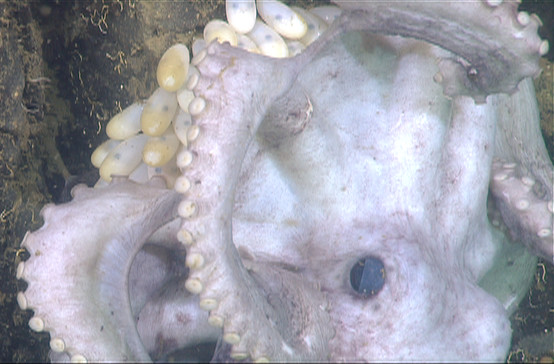

In April 2007, Bruce Robison and colleagues happened upon a deep-sea octopus more than 4,500 feet below the sea off California. When they came back about a month later it was guarding a clutch of eggs that appeared quite new and small. So Robison, from the Monterey Bay Aquarium Research Institute, and colleagues decided to take this opportunity to see how long these animals take to brood their eggs, as this hadn’t been investigated before. They came back shortly thereafter to find it was still holding onto the eggs – then back, and back again, a total of 18 times. Every time, the octo-mom was still faithfully clutching her offspring-to-be.
The octopus went about brooding her eggs for a total of 53 months (aka 4.5 years), which is by far the longest on record for any animal and more than twice the lifespan of many shallow-dwelling species. The longest any octopus had previously been known to brood was 14 months. But deep-sea creatures live in much colder waters, and it was previously unknown how long they might take to “raise” their offspring. The authors of the study, published today (July 30) in PLOS ONE, compare it to other known brooding records:
One of the craziest things about this: Octopus mothers aren’t thought to eat when they are raising their young. So how did it survive? The scientists don’t know, but the cold temperatures and slow metabolic rate of deep-sea animals may have helped. But it seemed to take a toll on the octopus, a member of the species Graneledone boreopacifica; over the course of brooding, the scientists observed her turn from a pallid purple to a much paler white, and they noticed the “diminishing size and tumescence [or swollenness] of the mantle, loss of skin texture, cloudy eyes, slack skin, and a loss of pigmentation.”
One advantage to investing so much maternal care is that when these species’ eggs hatch, they emerge like miniature adults and can therefore skip the juvenile stage that other octopuses have to pass through. Scientists think this gives them a better chance of surviving in the dark, mysterious world of the deep sea.

